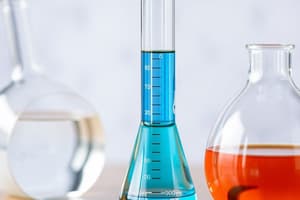Podcast
Questions and Answers
What is the main role of solvents in a solution?
What is the main role of solvents in a solution?
- Get dissolved in the solution
- Aid in conducting electricity
- Act as electrolytes
- Dissolve other substances (correct)
What property of water allows it to dissolve substances like sugar and salt?
What property of water allows it to dissolve substances like sugar and salt?
- Non-polar nature
- Polar nature (correct)
- Linear molecular structure
- Ionic bond formation
Which category of substances in a solution is defined by their ability to conduct electricity?
Which category of substances in a solution is defined by their ability to conduct electricity?
- Non-electrolytes
- Solute
- Weak electrolytes (correct)
- Solvents
In chemistry, what is the term used to describe the process of a solid solute dissolving in water?
In chemistry, what is the term used to describe the process of a solid solute dissolving in water?
What differentiates solvents from solutes in chemistry?
What differentiates solvents from solutes in chemistry?
Hook's Law states that the extension in an elastic material is inversely proportional to the force applied.
Hook's Law states that the extension in an elastic material is inversely proportional to the force applied.
The spring constant (k) in Hook's Law represents the flexibility of the spring.
The spring constant (k) in Hook's Law represents the flexibility of the spring.
Stress, strain, and Young modulus are key concepts mentioned in Hook's Law.
Stress, strain, and Young modulus are key concepts mentioned in Hook's Law.
Elasticity only applies to solids like plastics and springs, not liquids or gases.
Elasticity only applies to solids like plastics and springs, not liquids or gases.
To find the spring constant (k), one should multiply the force by the extension.
To find the spring constant (k), one should multiply the force by the extension.
Understanding Hook's Law is only useful for solving problems related to liquids.
Understanding Hook's Law is only useful for solving problems related to liquids.
Study Notes
- Introduction to the section on types of chemical reactions and solution stoichiometry in chemistry notes
- Definition of solvents as substances that do the dissolving in a solution, with water being a common solvent in aqueous solutions
- Description of water's ability to dissolve substances like sugar and salt due to its polar nature
- Explanation of the structure of water molecules as bent with a tetrahedral geometry and unequal sharing of electrons
- Differentiation between solvents (do the dissolving) and solutes (substances getting dissolved) in chemistry
- Process of hydration or solvation when a solid solute dissolves in water, replacing previous solute-solute interactions
- Introduction to strong electrolytes, weak electrolytes, and non-electrolytes as categories for solutions based on their ability to conduct electricity
Studying That Suits You
Use AI to generate personalized quizzes and flashcards to suit your learning preferences.
Description
Learn about solvents, including water, as substances that dissolve solutes in solutions. Explore the polar nature of water allowing it to dissolve substances like sugar and salt. Understand the distinctions between solvents and solutes, and the process of hydration or solvation in solution chemistry.




